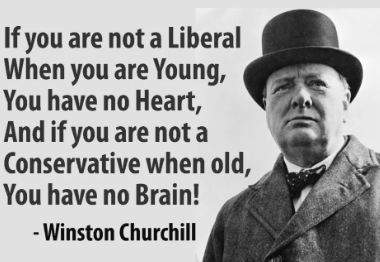“If you’re not a liberal when you’re 25, you have no heart. If you’re not a conservative by the time you’re 35, you have no brain.” — Winston Churchill (attributed)
It suggests that in one’s youth, there is often a tendency to be idealistic and compassionate, which aligns with liberal or progressive political beliefs. Young people may be driven by empathy and a desire for social change, hence the reference to having a “heart.”
“I learned always to follow your heart.” — Tori Bowie
In today’s society, the message of following one’s heart is plastered everywhere and in all forms of advice. Following one’s heart can lead to impulsive or epicurean behavior. Following one’s heart often means making decisions based on one’s emotions, desires, or limited intuition rather than solely relying on logic or reason. While this can sometimes lead to positive outcomes and fulfillment, it can also result in impulsive actions driven by immediate gratification or short-term desires.
“We must all suffer from one of two pains: the pain of discipline or the pain of regret. The difference is discipline weighs ounces while regret weighs tons.” — Jim Rohn
Usually, following your heart is impulsive, and it can take time for reality to set it by natural consequences. However, once it settles in, the regret weighs enormously on our conscience and destroys our happiness as we give up long-term quality for short-term gain.
As we covered in a previous article, Become Aware Our Polarized Nation Will Live By Stoicim or Die By Epicurean, it is dangerous to follow one’s heart as it is highly probable that it will create regret and heartache towards the end of one’s life as an individual and collectively as a nation.
Following your heart may not always align directly with Epicurean philosophy. Still, there can be overlaps when individuals prioritize their immediate desires or seek pleasure without considering the long-term consequences.

“The teens are emotionally unstable and pathic. It is a natural impulse to experience hot and perfervid psychic states, and it is characterized by emotionalism. We see here the instability and fluctuations now so characteristic. The emotions develop by contrast and reaction into the opposite.” ― G. Stanley Hall
In most cases, following your heart impulsively or indulging in immediate pleasures without considering the broader implications can lead to regret or negative outcomes.
“Adolescence is when the very worst and best impulses in the human soul struggle against each other for possession.” ― G. Stanley Hall

The frontal lobe and rational part of a teen’s brain aren’t fully developed and won’t be until the age of 25. (Health Encyclopedia)

We can see how important it is to allow time for the younger generation, as they are a tender root and a sponge to fully develop their ability to use reason and logic, problem-solve, have good judgment, emotional expression, self-regulation, sexual and behavioral control, and be aware of their lives.
Adolescents and young adults shouldn’t follow their hearts or intuitions without mature and disciplined feedback and a thorough discussion of long-term consequences.
“The heart is deceitful above all things, and desperately wicked: who can know it?” — Jeremiah 17:9
The phrase suggests that the human heart—symbolizing individuals’ innermost thoughts, desires, and motivations—is inherently prone to cognitive dissonance, deception, and wickedness. It emphasizes that humans are capable of self-deception, rationalizing their actions or desires even when they are morally wrong or harmful. It suggests that relying solely on one’s understanding or intuition can lead to moral error and spiritual peril.
The phrase serves as a cautionary reminder to approach matters of the heart with discernment and humility, recognizing the potential for self-deception and the need for moral guidance and spiritual insight.
As individuals age and gain more life experience, they may become more pragmatic and cautious, leading them to adopt conservative political beliefs. This shift is often attributed to personal responsibility, family commitments, career advancement, and exposure to different viewpoints, hence the reference to having a “brain.”
This concept captures the perception that political beliefs may change as individuals grow older and navigate different stages of life, with liberalism associated with youthful idealism and conservatism associated with mature pragmatism.
“We create our life experiences with our thoughts, feelings, and beliefs.” — John Holland
This concept is genuine; I would like it to be that simple, but it is more complex. One has to contend with many variables, such as DNA, how one was raised, how one interprets life, and the conditioning one receives through public schools and society.
“The true test of civilization is, not the census, nor the size of the cities, nor the crops – no, but the kind of man the country turns out.” — Ralph Waldo Emerson
To unwind the complexity and muddy water, we need to understand more about ourselves, which can only be accomplished by reflecting on our experiences and understanding life through the clearest glasses possible, removing self-deception and conditioning.

“You can’t be mature if you don’t know yourself. Experiences, failures, and reflection will bring you what you need.” — Maxime Lagace
As we build on the foundation of experiences and the importance of reflecting and being more cognitive and aware of our thoughts and emotions and how they were influenced. We can add how wise it is to learn from the experience of others.
“While it is wise to learn from the experience, it is wiser to learn from the experiences of others.” — Rick Warren
In a humorous but very poignant twist.
“There are three kinds of men. The one that learns by reading. The few who learn by observation. The rest of them have to pee on the electric fence for themselves.” — Will Rogers
Individuals who acquire knowledge and understanding through reading books, studying texts, or engaging in formal and informal education value learning through written sources and intellectual pursuits.
Unfortunately, fewer people are reading, which is a form of wisdom of learning from others.
We then have an individual who learns by observing the world around them, paying attention to their surroundings, and learning from the experiences of others. They may gain insights and wisdom through observation, reflection, and practical experience.
The rest of the people learn through direct experience, often through making mistakes or facing consequences firsthand through a painful or shocking experience of learning through trial and error.
“This simple idea is that our unique patterns of thinking, feeling, and behaving are significant factors in our experiences, both good and bad. Since these patterns have such a significant impact on our experiences, it follows that altering these patterns can change our experiences.” — (Martin, 2016)
Our emotions and thoughts can be altered from childhood to adolescence and adulthood. They can be twisted to create dependence on people or a system or help deprogram our experiences and put them into perspective.
The public school system is one of the greatest influences in molding our minds and hearts; in modern times, it is in a negative direction. (1)
“Mass schooling damages children. We don’t need any more of it. And under the guise that it is the same thing as education, it has been picking our pockets just as Socrates predicted it would thousands of years ago. One of the surest ways to recognize real education is by the fact that it doesn’t cost very much, doesn’t depend on expensive toys or gadgets. The experiences that produce it and the self-awareness that propels it are nearly free. It is hard to turn a dollar on education. But schooling is a wonderful hustle, getting sharper all the time.” — John Taylor Gatto, Dumbing Us Down: The Hidden Curriculum of Compulsory Schooling
We learn how the public schooling system, as intended by our country’s founding fathers, should be at the local level but has now been centralized in Washington.
“If government schools were maintained by local control, the problem of monopoly control of education for the entire school-age population would be greatly reduced. The “owners” of the school could be the local school boards, which could set curriculum and discipline standards and taxes. This solution is not perfect, but it is vastly better than a Washington-based economic czar using the educational system for propaganda, perpetuating the falsehoods of the state and the so-called benefits of a powerful central government. Thank goodness for the Internet, Amazon, and the thirst for truth that no government is big enough to silence.” — Ron Paul, Liberty Defined
The public school system in the United States has been a product of collective efforts over many years, involving activists, policymakers, and wealthy philanthropists who want to be our rulers.
“Washington versus the rest of the county. The real alignment now is a ruling class, country class. And the ruling class is made up of people all parties, all races, all creed. It’s Washington.” — Rush Limbaugh
The schools have been weaponized against the middle and poor classes (2) to dumb us down by stunting generation growth and continuing to keep adolescents emotionally charged, triggered, and flipping the lid (see the explanation in the video).
While they are emotional, they are easily manipulated and gaslighted to create mental distortions that are harmful in the short and long term.
In the meantime, Washington and the want-to-be ruling class have intentionally created layers of cognitive distortions in their psychologically conditioned programming from multiple fronts to win the culture war. (3)
Cognitive Behavioral Therapy (CBT), whose foundation is stoicism, can identify, understand, and combat automatic, emotion-filled thoughts to help humanity become more sane through stoicism.

Source: CBT Techniques: 25 Cognitive Behavioral Therapy Worksheets
“Cognitive distortions are biased perspectives we take on ourselves and the world around us. They are irrational thoughts and beliefs that we unknowingly reinforce over time.”
“These patterns and systems of thought are often subtle–it’s difficult to recognize them when they are a regular feature of your day-to-day thoughts. That is why they can be so damaging since it’s hard to change what you don’t recognize as something that needs to change!”
We learned that when we are younger, we are compassionate, which aligns with liberal or progressive political beliefs. This is tied to the heart and making decisions based on emotions.
One of the cognitive distortions is called “Emotional Reasoning.”
“This may be one of the most surprising distortions to many readers, and it is also one of the most important to identify and address. The logic behind this distortion is not surprising to most people; rather, it is the realization that virtually all of us have bought into this distortion at one time or another.”(4)
“Emotional reasoning refers to the acceptance of one’s emotions as fact. It can be described as “I feel it, therefore it must be true.” Just because we feel something doesn’t mean it is true; for example, we may become jealous and think our partner has feelings for someone else, but that doesn’t make it true. Of course, we know it isn’t reasonable to take our feelings as fact, but it is a common distortion nonetheless.” (4)
Generally speaking, most young people use emotional reasoning, and I see this happening into adulthood. It is as if our society is intentionally stunting the growth and maturity of our youth by keeping our children, adolescents, and now into adulthood in a constant state of emotions (fear) to keep our thoughts in the amygdala and Limbic system region of our brain and not allowing the frontal lobe and thinking region of our brain to develop fully. (5)

Constant emotional reactions may not necessarily inhibit the development of the frontal lobe. Still, they could impact its functioning and potentially affect cognitive processes, such as cognitive distortions, which allow the brain to develop healthy over time.
Our society is built around keeping people emotional, triggered, and flipping the lid. When people are emotional, individuals can be more susceptible to manipulation and control, as heightened emotions may cloud judgment and decision-making. Manipulators often exploit these vulnerabilities to influence behavior.
These manipulators come in the form of other individuals, from home to work to school. They can also be found in corporations trying to sell products, such as consumerism. They are found in government and the political arena, terrorizing, manipulating, and controlling the majority of the masses.
When we are emotional and are triggered by someone or words, we act on impulse and are highly susceptible to epicurean behavior. The more stoic people concentrate on metacognition, the less susceptible they are to emotional outbursts and are all about self-regulation. On the other hand, someone who is emotional and tyrannical is more apt to want to force their view on others through an overreaching government. The more emotional a society is, the more need it has for masters, Big Government, and Big Business. The more disciplined and stoic a society is, the less it needs government and big businesses as they are more self-reliant.
As we complete the arch, generally speaking, most people who I know, observe and read are affiliated with liberalism and are emotional creatures. I see society creating and advancing this idea of emotional reasoning as “I feel it. Therefore, it must be true.” As it benefits the oligarchy, statists, nationalists, and tyrants.
The brain is like a muscle; we need to think critically, which is part of the frontal lobe. Suppose we are constantly stirred up to stay in the amygdala and limbic system. In that case, our reason and logic, problem-solving, good judgment, and self-regulation will atrophy, gradually wasting away or shrinking, leading to cognitive changes and distortions and difficulties with decision-making, problem-solving, and emotional regulation. (This sounds like a mental health crisis, and Big Pharma benefits along with the statist, nationalists, and globalists as more and more people are dependent on Big Government and Big Business to take care of them as our nation enters into Bondage).

I hear we lack common sense all the time. I believe this is a major factor in why this is happening.
If society allowed human brains to fully develop without artificially manipulating generation upon generation, we would have a more mature, logical, and stoic society and fewer liberals.
There is an answer and cure for the ailment. By understanding and using emotional intelligence, along with Cognitive Behavioral Therapy (the modern-day equivalent of stoicism), we can assist ourselves, our children, and our countrymen in developing and evolving into better versions of themselves and not being emotional and manipulative or abused by tyrants in every facet of society. We can regain our power and return to being stoic, which is what we want to conserve, grow, and evolve. We aim for self-master and internal control to keep our liberty and freedom.

Bonus facts:

(1) Public Schools
- Revisiting John Taylor Gatto: “How public education cripples our kids, and why”
- The School System has Devolved into a Structure to Teach Reliance on Government and Tyrants
- Our Current Educational System Imposes Mediocre Standards As Act of War?
(2) Class Warfare:
- Class Warfare in the Cultural Battlefield is Against Americans in a Hidden War (Part 1)
- Class Warfare in the Cultural Battlefield is Against Americans in a Hidden War (Part 2)
- Liberty or Tyranny; it’s your choice, but choose intentionally
- Why Americans need to know about 5th Generational Warfare
- The Global Financiers Agenda to Gradually Takeover Government and Industry: The World
- World War 3 Isn’t What You Think; It is the Globalists vs the Rest of Us
(3) Culture War:
- Culture War: Loyalists vs Revolutionaries
- Culture War – What Values Have Been Taught To Our Children?
- What Kind of Man Is Our Country Turning Out? – Values and Principles
- Culture War: Loyalists vs Revolutionaries (Self-Anointed and Woke) (part 2)
(4) Cognitive Distortions: 22 Examples & Worksheets (& PDF
(5) How Emotions Have Been Hijacked By Psychological-Conditioning Programs
- How the Younger Generation Has Been Programmed By Psychological-Conditioning Programs
- How Emotions Have Been Hijacked By Psychological-Conditioning Programs (Part 1)
- How Emotions Have Been Hijacked By Psychological-Conditioning Programs (Part 2)
Additional subjects contribute to our society from where we have been to today.
Monopolies:
- Monopolies are Anti-American: They were detested by the Founding generation (part 1)
- Monopolies are Anti-American: They were detested by the Founding generation (part 2)
- Monopolies are Anti-American: How Corporations Became “People” (part 3)
- Monopolies are Anti-American: The Subverting of America into the Chinese Model (part 4)






